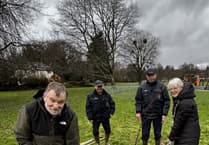poultry farmers in the south west have been advised to be vigilant but not to panic after an outbreak of the deadly H5N1 strain of bird flu in Suffolk. NFU SW spokesman Ian Johnson said: 'They need to be aware and vigilant but not panicking. Obviously if you keep chickens look at them every day.' He said that poultry keepers should report any problems straight away. 'Defra would rather people came to them if they were concerned even if it turned out to be a false alarm, which is what appears to be happening around that plant in Suffolk. 'It's been contained in one shed on one farm, a significant distance from here. Hopefully it has been dealt with.' The outbreak occurred on a Bernard Matthews farm at Upper Holton, Suffolk, on Thursday last week. Defra moved swiftly to cull 159,000 turkeys housed in 22 sheds. Poultry keepers and egg producers within a 10km area round the plant have been asked to take all birds indoors. Mr Johnson said that tracking down the cause would be difficult and may never be known. One theory is that the infection came from feed dust getting round the ventilator. He said that hygiene and bio-security were paramount. Mandy Jackson, partner of Lady Lay, organic egg producers in Ashburton, said: 'I am fairly confident mainly because we are not in the migratory flight path, also because we are small – being organic.' Her birds go outside from a few weeks old and spend their whole lives outdoors. 'I'm finding it very interesting that it's large commercial flocks that are getting infected. They seem to be more vulnerable. 'The French ones that got the H5N1 strain were an indoors flock. I've yet to hear of an organic flock being infected. 'When birds are indoors they're in such close quarters, it's like school, when one child gets a cold they all get colds.' Mike Malseed, of Frenchbeer Farm, Chagford, who raises free-range turkeys for the Christmas market, was also struck that the virus has hit intensive indoor units with high bio-security. 'It's interesting that the outbreak in Hungary was also one of Bernard Matthews' plants. There's no evidence of the disease in the wild bird population or free-range flocks. I'll be interested to see what the investigation comes up – I think they won't come up with anything.' Normally, Mr Malseed buys in 4,000 poults in May or June. 'At the moment we are just waiting,' he said. l Neil Parish, south west MEP and now chairman of the European Parliament agriculture committee, called for Defra to find a way to incinerate potentially-infected carcasses on site. The culled turkeys from Suffolk were transported to Staffordshire. 'The lessons learnt from foot and mouth show that we should not move infected carcasses. 'Although the containers will be sealed, moving carcasses across the country is just one risk not worth taking. 'Defra needs to invest in technology that allows the carcasses to be incinerated on site,' he said.



